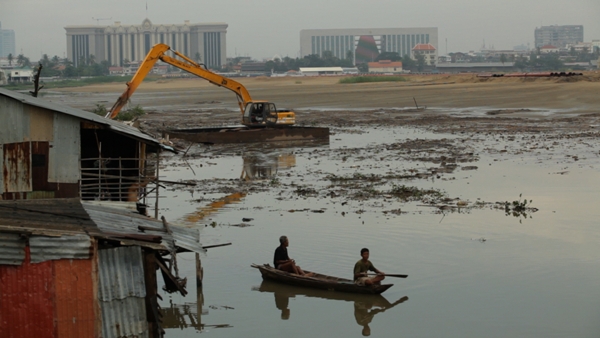Filmmaker Kalyanee Mam (director of photography for the Oscar-winning documentary Inside Job) returns to her native Cambodia for a story of globalization and its impact on people and nature. She introduces viewers to three individuals who are all facing struggles to find work, maintain families, and maintain their strong ties to tradition and culture.
Khieu Mok lives in a small village with her mother and siblings on a small rice farm, trying to live off the land. Her mother is in debt, and meeting the payments is a constant struggle. Eventually Khieu goes to Phnom Penh to work in a garment factory to earn money to help her mother pay off the debt. Life in the city is fast paced and anonymous, but the pull of home and family never weakens.
Sav Samourn and her family live in a remote and mountainous jungle region of northeast Cambodia. They, too, live off the land and depend upon the resources of the forest for their livelihood. But large companies are buying the land, cutting the timber for sale on the international market, and, as a result, destroying a way of life.
Sari Math lives on the Tonle Sap river in Central Cambodia, and his family are fishermen. As the oldest of six children, Sari is forced to leave school in the seventh grade in order to help support the family. Due to large fishing concessions and the rise of illegal fishing, the family barely catches enough to survive. Like Khieu, Sari will leave home and find a job to help support the family.
Documented over a period of years, the quiet, non-intrusive verité style of the film makes tangible, and human, the colossal concept of globalization, which is no longer just about inexpensive clothes and food. These Cambodians struggle to hold on to their families and to keep their ties to the land, but how can they do both in a world constantly changing and seeming to destroy both? It is more than prophetic that future generations will have no land and that they will continue to struggle.
There is no narration and little dialogue, and the exquisite photography and music amplify the colorful beauty of the land. The strength of the people is admirable and their words heartfelt. Not only will viewers be left haunted by scenes of forest clear cuts, they will remember Sari’s desire to learn and his wish to stay in school. His days are now filled with back-backing physical labor far from his home. At the end when the director (off-camera) asks him a few questions at his workplace, the look in his eyes is indelible.







Leave A Comment